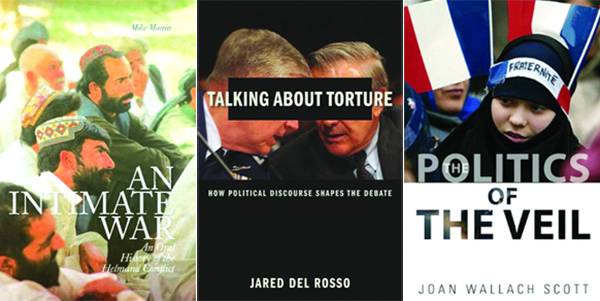
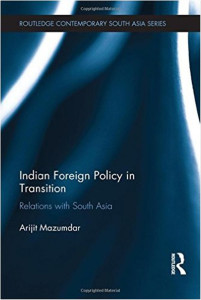
Indian Foreign Policy Transition: Relations with South Asia
Arijit Muzumdar
Routledge (hardcover), 2015
PRs 13,999
India’s relation with other South Asian countries has been impacted by recent developments in the post-Cold War period. These include India’s economic rise, the recent democratic transitions in many South Asian countries and greater US engagement in the region following 9/11. This book is an effort to address these issues and examine their role in India’s interactions with its neighbours.
Indian Foreign Policy in Transition provides a comprehensive overview of India’s relations with the South Asian countries of Pakistan, Afghanistan, Bangladesh, Sri Lanka and Nepal, Bhutan and the Maldives. As well as looking at India’s past and present foreign policy, the book analyses recent political changes and developments. It identifies the broad tenets of India’s policy towards the other countries of South Asia, and the domestic factors that impact India’s policy in the region. It looks at India’s historical patterns of interactions with its neighbours, and describes recent developments in these South Asian countries and their perceptions of India. By providing specific examples of the major disputes and conflicts between India and its neighbours, the book explores the challenges inherent in promoting peace and cooperation, and goes on to highlight the growing US influence in South Asia.
Providing an in-depth discussion on the opportunities and challenges facing India in the South Asia region, the book is an important contribution to Indian and South Asian Politics, Foreign Policy, and International Relations.
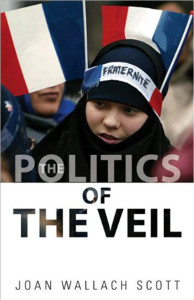
Politics of the Veil
Joan Wallach Scott
Columbia (hardcover), 2007
PRs 3,100
In 2004, the French government instituted a ban on the wearing of “conspicuous signs” of religious affiliation in public schools. Though the ban applies to everyone, it is aimed at Muslim girls wearing headscarves. Proponents of the law insist it upholds France’s values of secular liberalism and regard the headscarf as symbolic of Islam’s resistance to modernity. The Politics of the Veil is an explosive refutation of this view, one that bears important implications for us all. Joan Wallach Scott, the renowned pioneer of gender studies, argues that the law is symptomatic of France’s failure to integrate its former colonial subjects as full citizens. She examines the long history of racism behind the law as well as the ideological barriers thrown up against Muslim assimilation. She emphasizes the conflicting approaches to sexuality that lie at the heart of the debate—how French supporters of the ban view sexual openness as the standard for normalcy, emancipation, and individuality, and the sexual modesty implicit in the headscarf as proof that Muslims can never become fully French. Scott maintains that the law, far from reconciling religious and ethnic differences, only exacerbates them. She shows how the insistence on homogeneity is no longer feasible for France—or the West in general—and how it creates the very “clash of civilizations” said to be at the root of these tensions. The Politics of the Veil calls for a new vision of community where common ground is found amid our differences, and where the embracing of diversity—not its suppression—is recognized as the best path to social harmony.
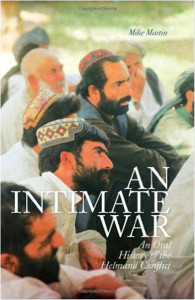
An Intimate War: An Oral History of the Helmand Conflict
Mike Martin
Hurst (hardcover), 2014
PRs 4,110
An Intimate War tells the story of the last thirty-four years of conflict in Helmand Province, Afghanistan as seen through the eyes of the Helmandis. In the West, this period is often defined through different lenses—the Soviet intervention, the civil war, the Taliban, and the post-2001 nation-building era. Yet, as experienced by local inhabitants, the Helmand conflict is a perennial one, involving the same individuals, families and groups, and driven by the same arguments over land, water and power. This book—based on both military and research experience in Helmand and 150 interviews in Pashto—offers a very different view of Helmand from those in the media. It demonstrates how outsiders have most often misunderstood the ongoing struggle in Helmand and how, in doing so, they have exacerbated the conflict, perpetuated it and made it more violent—precisely the opposite of what was intended when their interventions were launched. Mike Martin’s oral history of Helmand underscores the absolute imperative of understanding the highly local, personal, and non-ideological nature of internal conflict in much of the ‘third’ world.
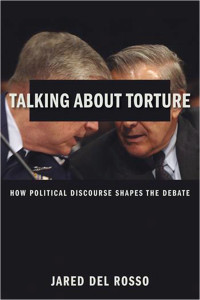
Talking about Torture: How Political Discourse Shapes the Debate
Jared Del Rosso
Columbia (hardcover), 2015
PRs 6,200
When the photographs depicting torture at Iraq’s Abu Ghraib prison were released in 2004, U.S. politicians attributed the incident to a few bad apples in the American military, exonerated high-ranking members of the George W. Bush administration, promoted Guant namo as a model prison, and dismissed the illegality of the CIA’s use of “enhanced interrogation.” By the end of the Bush administration, members of both major congressional parties had come to denounce enhanced interrogation as torture and argue for the closing of Guant namo. What initiated this shift? In Talking About Torture, Jared Del Rosso reviews transcripts from congressional hearings and scholarship on denial, torture, and state violence to document this wholesale change in rhetoric and attitude toward the use of torture by the CIA and the U.S. military during the War on Terror. He plots the evolution of the “torture issue” in U.S. politics and its manipulation by politicians to serve various ends. Most important, Talking About Torture integrates into the debate about torture the testimony of those who suffered under American interrogation practices and demonstrates how the conversation continues to influence current counterterrorism policies, such as the reliance on drones.
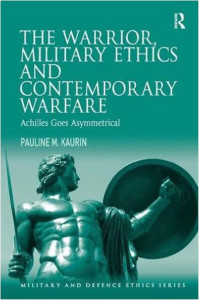
The Warrior, Military Ethics and Contemporary Warfare: Achilles Goes Asymmetrical
Pauline M Kaurin
Ashgate (hardcover), 2014
PRs 9,865
When it comes to thinking about war and warriors, first there was Achilles, and then the rest followed. The choice of the term warrior is an important one for this discussion. While there has been extensive discussion on what counts as military professionalism, that is what makes a soldier, sailor or other military personnel a professional, the warrior archetype (varied for the various roles and service branches) still holds sway in the military self-conception, rooted as it is in the more existential notions of war, honor and meaning. In this volume, Kaurin uses Achilles as a touch stone for discussing the warrior, military ethics and the aspects of contemporary warfare that go by the name of ‘asymmetrical war.’ The title of the book cuts two ways-Achilles as a warrior archetype to help us think through the moral implications and challenges posed by asymmetrical warfare, but also as an archetype of our adversaries to help us think about asymmetric opponents.

